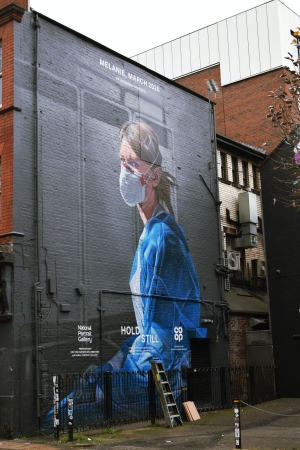Chris Potter
Critical Care Champions have Released a Statement
Critical Care champions have chosen to release a statement that helps to highlight social justice. This is especially interesting to know if you work in a nurse agency, a nursing recruitment agency or even if you know some carers who are seeking care jobs. BACCN have said that they want to try and extinguish any bias while also eliminating stereotypes. The statement has been put out there in collaboration with a lot of other nursing staff who want to try and ensure diversity, equality and even inclusion with their role. They want to try and advocate for those who need it and they also want to try and create a fair environment where possible. It has been explained that the idea of social justice embraces a lot of key elements and that this needs to be prioritised when it comes to nursing. Fairness should be upheld for everyone and this happens to include staff who work in roles such as critical care. BACCN have said that they are a somewhat inclusive organisation and that they do understand the challenges that exist. The organisation have explained that it is their vision to try and advocate for things such as social justice and that they intend to do this by eliminating the bias that is present right now. They want to try and take a somewhat collaborative approach and they want to work with members of the BACCN too.
Only time will tell what the future holds but at the end of the day it seems like more has to be done to give support to those who truly need it. This movement is positive but it looks like the NHS is on its knees and that people are not getting the mental health support they need.
The Government are Contemplating an Anti-Strike Bill
If you work in the carers sector or if you are looking for care jobs right now then you should know that those who work in a nurse agency or a nursing recruitment agency are currently on strike. Granting an above-inflation pay deal to those who work in the public sector is simply not a good way to try and move forward and a lot of people are inclined to agree. Grant Snapps has set out a government law which basically says that there is going to be a minimum level for safety and that industrial action cannot put the health of others at risk. NHS nurses and those who work as ambulance staff are now taking things one step further as they stage action over the row that is happening. Health unions have met with Mr. Barclay but they have said that the discussions are yet to resolve. He has said that the government do have every intention of trying to resolve the dispute but at the end of the day they also want to be both fair and responsible to the tax payer. They have said that there is some progress that has been made but there is still a way to go. Right now it’s safe to say that UK households are struggling with the high inflation. This has been brought on by covid but at the end of the day you also have the Ukraine invasion. More has to be done to support those who are working endlessly for the safety of others and it would seem that a nursing strike is the way that people’s voices are ging to be heard. Who knows what’s going to happen next but it’s safe to say that things are being taken to that next level.
NMC have Issued a Statement to Nursing Professionals
If you want to pursue work with a nurse agency or if you know that you want to work with a nursing recruitment agency so you can help carers and those seeking care jobs then you should know that the NMC have issued a new statement. They have said that right now, there are tough conditions and that nurses are under more pressure than ever. Andrea Sutcliffe who is the registrar of the NMC has set out to try and provide a lot of reassurance to staff who may well be concerned about making mistakes and also being referred. This comes after the UK government have announced that they are going to try and alleviate some of the pressure that the NHS is under while also doing their bit to limit mistakes. They know that the NHS is under a lot of pressure with the winter period and that they also understand how difficult it is for professionals who are working in the industry as well.
It's also important to know that health workers have expressed their concerns and that health leaders have called on ministers to try and get them to address the issue. Steve Barclay who is the health and social care secretary has said that the government are now supporting the sector in an attempt to alleviate some of the pressure but there are concerns that this is not enough. Out of the money that they have been given, a lot of it is going to help build some beds in care homes. This means that people who are medically fit can then be discharged from hospital so they do not end up taking extra beds away from those who may need them. This could solve some of the issue but it won’t solve all of it.
A Nursing Professor has Joined a Struggling Board Trust for Mental Health
Sally Hardy has joined the Suffolk and Norfolk NHS foundation in an attempt to try and better the industry. She has taken up the new position and she hopes to try and turn it around. The trust has been rated as not good enough in the past, with the current status being “inadequate”. It is her goal to try and bring some fresh eyes to the sector. She started out her career in London and she is also known for having a clinical degree as well. She has a doctorate from UA and then she moved to Australia. It is there where she carried out work at the Children’s Hospital in Melbourne.
Upon returning to England, she then held a senior position at the City University where she contemplated going into care jobs or working with a nurse agency. She debated a nursing recruitment agency where she could work with carers too. She then returned to the UEA as a deal for the School of Health Sciences. She has said that she is very excited about the concept of joining the team and that she hopes to help turn things around by simply giving support to those who need it. She has also said that she sees an opportunity to improve the healthcare sector by engaging with staff and various social care organisations. She wants to try and look into exciting possibilities and she is very willing to try and make sure that everyone is getting the care that they need without compromise. She is also able to bring a clinical perspective, along with knowledge in regards to improving change across various complex organisations. She wants to do what she can to improve mental health services and she is very proud of the work that she has done in the past. Only time will tell if a change is going to be made but right now things are looking up.
RCN knocked back government attempts to strike again, saying it wasn't right to put it that way.
In a weekend letter exchange, the Royal College of Nursing warned Health and Social Care Secretary Steve Barclay that its members' attitude is "negotiations or none at all" in light of the upcoming nurse wage strikes.
Mr Barclay wrote to the RCN urging it to think again and "get back to the table" after the union said it would take action on Thursday, 15, and Tuesday, 20 December, in England, Wales, and Northern Ireland. "We will certainly discuss how we can improve the working conditions of staff."
Mr Barclay said there would be no pay increase but that the government had accepted the NHS Pay Review Body's recommendation.
I am prepared to discuss what can improve the lives of nurses and other staff.
However, the government has accepted the pay recommendation of an NHS Pay Review Body. In its entirety.
Mr Barclay said that the Government "must also take into account the difficult economic circumstances" facing the UK.
"I encourage you to think carefully about your position and return to the table to settle the dispute."
Mr Barclay said that employers affected by strikes should be formally contacted "as soon as possible".
Ms Cullen responded to a request from Mr Barclay for a meeting to discuss a settlement to the ongoing dispute over NHS pay and patient safety.
Ms Cullen wrote to Mr Barclay: "I'm afraid the position of my members is that it is 'negotiations or nothing."
You can't shut them out and keep saying you are open. If your members sit across from them, it shows that you are not seriously interested in progress.
"We need to resolve this. It is only a fortnight before we strike."
It isn't easy to be in the NHS without stuff like that, so some people can't get the pay raises they deserve.
Mr Harper said that pay rises that don't keep pace with inflation are unaffordable for many workers.
We'd like to give public sector workers who work very hard a decent pay rise, but it must not be an inflation-buster.
RCN members want their pay to rise by 5% over what they would get if the pay increases were 1% above what they would have earned.
Over the next three years, nurse salaries in England, Wales, and Scotland will increase by less than the inflation rate. However, nurses in Northern Ireland have not yet received a salary increase for the current year.
Ms Cullen stated that a salary raise for nurses is unsustainable when millions are spent on interim solutions to relieve the NHS staff issue.
It has come to light that the National Health Service (NHS) in England is short 47,000 nurses, and union members are still not paid their due share.
Paying nurses somewhat is essential, but so is recruiting and maintaining the kinds of nurses who will help keep patients safe.
Ms Cullen has stated that strikes are the last choice, but they have been endured for too long. Nurses will not stand by as their patients are endangered; they will act to protect both their patients and themselves.
Union Unison has surveyed its members throughout the UK to gauge their opinion of the wage increases awarded to nurses this week.
There will be a general strike in Northern Ireland since unions have successfully gotten parliamentary permission. The general election results in England and Wales are expected to be announced by union leaders this week.
Scotland's unions also consider a government salary offer as they negotiate a new contract.
CEO of Unison Christina McAnea responded to Mr Harper by saying that public servants cannot sustain annual salary cutbacks. They have hit bottom, and so has their family. Workers in the public sector are running out of options because the rising cost of living makes it impossible for them to continue providing vital services.
Numerous workers are leaving their positions, or have already departed, to pursue higher income in other industries. Their bills have increased dramatically, which will assist them in paying them.
There won't be anybody to take care of our health, support the underprivileged, operate our schools, or offer other essential community services if ministries don't pay employees enough.
RCN announces first December nursing strike areas.
The Royal College of Nursing has confirmed today that there would be strike action by nurses at just half of the NHS staff in England, where legal authorization for strikes was gained. This news comes after the legal mandate for strikes was achieved.
Despite this, the union has warned that the number of employers in the NHS affected by industrial action would increase in January if discussions on wages are not undertaken.
The news comes following a ballot result earlier this month that made history by showing that RCN members at the majority of NHS employers throughout the UK voted to strike over salary and patient safety concerns. The voting was held by the Royal College of Nursing (RCN).
The College of Nursing has now declared that up to 100,000 nursing staff members will participate in strikes in England, Wales, and Northern Ireland. The dates of the planned strikes are the 15th and 20th of December.
According to a statement issued by the college this afternoon, union members want to participate in actions at fifty percent of the places in England where the legal mandate for strikes was successfully obtained.
According to the proposals, there will also be strike action at every Health and Social Care workplace in Northern Ireland and every NHS employer in Wales, except one.
While this is happening, preparations to strike in Scotland have been temporarily put on hold. At the same time, the Royal College of Nursing and other unions are evaluating a new salary offer from the Scottish Government.
The health and social care state secretary, Steve Barclay, issued a letter to the union imploring it to reconsider its position and "come back to the table." The announcement of the strike areas came just a few days after the letter was sent.
Despite this, he noted in the letter that there would be no change to the compensation at this time.
The Royal College of Nursing (RCN) is advocating for a salary increase for its members that is 5% more than the RPI inflation rate.
Nevertheless, for the fiscal year 2022–2023, registered nurses in England, Wales, and Scotland were all given raises lower than the inflation rate. On the other handstate, registered nurses in Northern Ireland are still awaiting a wage award for this year.
Pat Cullen, chief executive and the general secretary of the RCN, made the following statement on Tuesday: "Ministers have declined my offer of formal pay negotiations and instead chosen strike action." She continued by saying that this has left the RCN with no choice but to announce where its members will be going on strike in December.
Ms. Cullen said , nurses are not only taking a stand for their profession but also for their patients.
She went on, "We've been tired of being taken for granted and inability to offer the care they need."
The ministers still have the authority and the capacity to end this situation by launching conversations that resolve our disagreement.
When the Department of Health and Social Care was asked to comment on the announcement of striking areas, a prior statement from Mr. Barclay was cited as the department's response.
In this letter, he made the following statement: "I am tremendously thankful for the hard work and devotion of nurses and profoundly regret that some union members will be conducting strike action." [citation needed]
These are difficult times for everyone, and the current state of the economy makes it impossible to meet the demands of the RCN. Based on the most recent estimates, the RCN is asking for a pay raise of 19.2%, which would cost £10 billion annually.
He continued, "The safety of our patients is our priority." The National Health Service (NHS) has implemented strategies that have been tried and accurate to minimize disruptions and guarantee that emergency services will continue to function.
While this was going on, a spokeswoman for the Welsh Government issued the following statement: "We recognize why so many nurses voted the way they did, and we agree that nurses should be adequately rewarded for the essential work they do."
We are also aware of the frustration and disillusionment many people working in the public sector are experiencing now.
They again indicated that they could not raise the amount of money that was being offered for pay "without extra cash being made available by the UK government."
In addition, the Department of Health in Northern Ireland stated that it "shares the unhappiness of Northern Ireland health care personnel at the lack to date of a salary award for this year."
In addition, it expressed disappointment that so many health and care workers feel that taking strike action is required.
The following was added to the statement: "If strike action takes place, the Department and HSC Trusts will engage closely with labor unions to safeguard key services as much as practicable."
However, there will invariably be an effect on the care provided to patients, in addition to a further deterioration of services that are already under extreme pressure.
UK nursing registry has a record number of foreign nurses.
The Nursing and Midwifery Council (NMC) reports that the number of registered nurses and nurse practitioners in the United Kingdom who were educated outside the nation is rising. About half of the new nurses who signed up in the last six months had received their education abroad.
More than 13,000 additional nursing professionals will be added to the registry between April and September of 2022, bringing the total number of registered nurses to a record high of 771,445. The NMC reports that nurses educated in countries other than the UK are primarily responsible for increasing the number of registered nurses, midwives, and nursing associates during the past six months.
During the period under review, 11,496 nursing staff members with international training entered the registry for the first time. There were 5% more nurses from outside the United States joining in the same period in 2021, and there was a slight drop in the number of nurses who had received their training in the United Kingdom, from 12,102 to 12,012.
The data show that the NHS increasingly relies on nurses educated abroad to fill nursing shortages.
Fewer than 24,000 newly registered nurses in the United Kingdom have earned their education outside the country in the twelve months before September 2022. More than 30% more persons joined the register than the previous year and about 5x as many as the 5,083 who joined in the 12 months before September 2018.
Meanwhile, in the 12 months before September 2022, over 24,100 nurses with training in the UK entered the register for the first time. This is a rise of 4% from the same time in 2021 and an increase of 9% from the same time in 2018.
The bulk of the 7,241 new international nurses had training in India or the Philippines. To this day, Ghana and Nigeria are still two of the top ten countries providing nurses despite being on the WHO's red list of countries from which recruitment should be avoided.
The chief executive and general secretary of the Royal Nursing College, Pat Cullen, noted that these findings raised severe ethical concerns.
She said, "The government is stealing the rest of the planet to cover up for big losses at home, and they provide statistics ministers with difficult ethical questions to address." According to the statistics, ministers "have no choice but to address these concerns."
"To swiftly improve recruitment and retention, we have consistently requested that the British government invest in nursing, particularly in fair pay.
Then she claimed, "they're recruiting nurses from nations that can barely afford to offer them themselves," citing countries like Nigeria and Ghana as examples. To keep their jobs, they hire nurses from nations that can hardly afford to pay them." Colleagues who have studied or worked in different countries bring a wealth of experience and knowledge.
According to NHS Employers chief executive Danny Mortimer, the growing reliance on foreign workers in recent years reflects a deficiency in training and education in the UK.
Health leaders like Mr. Mortimer have been pressing the government for details on the workforce plan detailed in the chancellor's autumn statement "against a setting of 132,000 job vacancies" because more than 40,000 nurses have already left the NHS. This would build on earlier government initiatives to attract nurses from overseas, ensuring a well-trained and diverse NHS staff," he said. The National Health Service is amidst a major personnel crisis due to the vacancy of 132,000 posts and the departure of around 40,000 nurses.
Unison's head of health Sara Gorton agreed that salary and staffing were at the heart of the NHS's problems.
The NHS will maintain its tradition of respecting its international staff. She noted that a retention plan for UK health professionals was urgently needed and that relying on recruitment from other nations was not an appropriate solution.
Ms. Gorton has urged the government to fix NHS pay to prevent staff turnover and improve patient care.
The NMC data also revealed unprecedented levels of ethnic diversity across the nursing workforce in the UK. Asian, Black, and other minority ethnicities comprise more than a quarter of the nursing workforce.
Approximately 26% of all registered nurses, midwives, and nursing associates in the United Kingdom are members of minority ethnic groups, including Blacks and Asians. Compared to the total for 2018, this is an increase of 7%.
This reflected a more ethnically diverse workforce trained in the United Kingdom and an increase in nurses recruited from other countries. About a quarter of newly registered British nurses with minority racial or ethnic backgrounds were of African-American, Asian, or another non-white ancestry between April and September this year.
Andrea Sutcliffe, CEO and registrar of the NMC, emphasized the "vital" need to support the increasingly diverse nursing and midwifery profession adequately.
In a survey published earlier this year, the Nursing and Midwifery Council (NMC) found that referrals to the regulator were disproportionately higher for nurses who reported feeling like "outsiders" due to protected characteristics like race or gender.
Rishi Sunak Urged to Revisit NHS Pay
If you are currently seeking out care jobs or if you want to work in the carers profession but you know that the lack of pay is steering you away then you are not alone. Many people go through a nursing recruitment agency but are then shocked at the amount of pay that they are going to get for the hours that they do. That is why a lot of nurse agency providers are pushing the new Prime Minister to revisit the concept of NHS pay so more can be done to support those who are in need.
Rishi Sunak has said that he does intend to address the NHS and that he is putting social care as one of his priorities. He has also said that he does intend to visit the pay offer that he has created for the NHS. That being said, health leaders are concerned as they are worried that not enough is being done. It has been announced that Rishi is now the new leader of the party and that he is officially the new Prime Minister of the UK. Nursing staff will have to remember that this year, the pay cut was designed by him. He did this from behind his treasury desk. Some people think that the Prime Minister, who took over Liz Truss, is going to make the situation for nurses worse by not listening to their concerns. A lot of people think that this is going to lead to even more strikes in the future which could spell disaster for the healthcare industry. Of course, only time will tell what the future holds but right now it looks like no action is going to be taken unless organisations step up and demand more from the UK Prime Minister.
An NHS Recruitment Drive is Trying to Address Nursing Shortages
The NHS in England have chosen to launch a recruitment drive. Their aim is to try and attract thousands of people into nursing jobs as right now it would seem that there is a record level when it comes to staff shortages. If you work in a nurse agency or if you are working through a nursing recruitment agency because you are seeking care jobs then you should know that there is a lot of pressure on nurses right now. Those who work as carers are now experiencing a record number of staff vacancies and this is not good to say the least.
If you look at the campaign, you will see that Dame Ruth May has come out to make a direct appeal so that they can urge the public to try and join up as nurses. They have also put in a lot of work to highlight the type of contributions that the profession is going to make to social care. At the end of the day, nursing is a life-changing job and there isn’t a single day that is the same as the next. NHS England are now saying that the workforce is desperately trying to prepare for a very difficult winter and when you look at the rise of influenza, you will soon see that the staff vacancies are going to be at an all-time high. A lot of people are worried about coronavirus as well as this could lead to even more vacancies overall. Studies have shown that there are over 47,000 staff shortages and that this is truly not good at all.
Only time will tell what is going to happen next but at the end of the day, it looks like more has to be done to try and support nurses as much as possible.
Steve Barclay is now the Health Secretary for the UK
If you are seeking care jobs or if you are trying to break through into the carers industry as a career change then you may be interested to know that leaders have now called upon the health secretary to see if he is able to offer more support to nurse agency organisations across the UK. If you work as part of a nursing recruitment agency then you should know that this is actually the third time in a total of four months that the government have in fact appointed a health secretary. They have had a lot of U-turns and they have also had a lot of disruption too. The challenge for the health secretary was to try and demonstrate to care workers as well as to health professionals that he has in fact been able to learn from some of the earlier mistakes that he has made. He was appointed by Rishi Sunak on Tuesday and he has also served the role, although briefly, under Boris Johnson. Even though he has had a very short tenure, it is important to know that he wants to try and ramp up the amount of recruitment that is taking place overseas. He intends to do this as part of a very challenging winter.
He has also been in charge of the NHS Pay Body Review as well. This is to try and give NHS nurses a pay rise in general. At the end of the day, the Unions have called to try and get a pay rise that is above inflation rather than just being on the same level of it and this has actually led to a lot of frustration. Now it looks like progress could be made but only time will tell if this is going to be the case going into the future.













